ACTION AGAINST ASSAULTS





















































Adelegate to our recent annual general meeting in Glasgow observed from the rostrum that it was the most unified they had ever attended, and it certainly felt that way.
AGM is the Parliament of our union, and it is where our delegates collectively set RMT priorities for the next 12 months.
I would like to Glasgow 5 branch for being excellent hosts and I would like to thank Glasgow Shipping members for organising the moving tour of International Brigade memorials in the city.
Top of our agenda is making sure employers across the transport industry deal with staff assaults. Too many of our members are going to work in fear. They are being punched, spat at, racially abused, threatened with weapons and attacked while simply doing their jobs.
What is equally disturbing is the response of too many employers, who seem to think they do not need to provide adequate support, despite the increasing dangers.
Our union is clear that well-staffed places of work lead to a safer workplace and a greater sense of security amongst passengers.
We are demanding mandatory reporting of assaults with every staff member who is assaulted accompanied to hospital where needed, and employers must ensure paid leave is available to recover physically and mentally.
A zero-tolerance policy must mean more than a poster. It must be backed up by enforcement and by real consequences for those who attack transport workers.
Another top priority is ending the scandal of outsourcing. The Labour

government promised to undertake the biggest wave of insourcing in a generation, and we will hold them to that pledge.
Insourcing improves service quality and saves money in the long term. It also removes the perverse incentive for private firms to cut corners and exploit staff to maximise profit.
With South Western Railway and c2c now back in public ownership, the government has taken an important first step. But leaving outsourced contracts untouched undermines everything that public ownership is supposed to stand for.
Outsourcing and subcontracting firms are taking around £400 million a year in profits from rail contracts, according to our analysis. This money should be going back into the railway to improve services and bring down fares.
The new Great British Railways must be an example of a new ethos where workers and passengers feel they have greater ownership over the service and the ability to shape its future.
RMT will be at the table regardless defending our members interests and advocating for the best passenger experience possible.
This union will not be meek in the face of intransigent employers. Nor will we look away and hide when faced with wider injustices taking place outside Britain. Our union will always strive for a world that lives in peace and fight for a decent standard of living for all workers in Britain.
The road ahead will be tough, but RMT is built for these battles and we’re in it to win for our members.
Eddie Dempsey


AnRMT survey of Tyne and Wear Metro cleaners has laid bare the devastating impact of outsourcing, with most staff reporting poverty pay, lack of sick pay, and rising workloads under private contractor Churchill.
The survey of Metro cleaners, employed by outsourcing firm Churchill, was conducted in July and found:
• 70 per cent sometimes or regularly struggle to make ends meet
• 67 per cent can’t afford to take time off if they’re sick
• 85 per cent have worked while sick
• 87 per cent worry about not having enough to live on in retirement
• 90 per cent say workloads
are rising
• 90 per cent say Churchill does not employ enough staff to do the job properly
• 87 per cent believe Metro services would improve if cleaning was brought back in-house
RMT is calling on the Mayor of the North East Combined Authority Kim McGuinness to immediately end the outsourcing of Metro cleaning services and commit to insourcing the contract when Churchill’s deal ends in August next year.
Churchill, which holds cleaning contracts across the rail network, paid out a £43.9 million dividend last year— much of it to a private equity fund.
The company boasts 22
per cent gross profit margins, achieved in part bypassing public sector cost increases, such as wages and National Insurance, back to its clients like Nexus who run the Metro.
Yet Metro cleaners are denied company sick pay, proper pensions, and have been offered no pay rise beyond the Living Wage.
RMT general secretary Eddie Dempsey said that the findings must be a wake-up call to employers and politicians.
“Metro cleaners are being exploited by a private contractor that prioritises making huge profits over the interests of our people who keep transport clean in the region.
“This union will not be ruling out calling strike action
if bosses do not start to treat cleaners properly.
“This is part of our national campaign to end outsourcing, and we are calling on the North East Mayor to insource these workers as soon as practically possible,” he said.
Sixteen MPs have signed a parliamentary motion backing the campaign to end outsourcing on the Tyne and Wear Metro.
Elsewhere in the industry, ScotRail and Northern have long since insourced their cleaning operations, while the Welsh government and Mayor of London are also moving away from outsourcing.
RMT will continue to fight until Metro cleaners win justice, as part of the union’s national insourcing campaign.

RMT has condemned First Group’s huge profits and its ongoing exploitation of Britain’s fragmented railway system through open access operations.
The company announced a surge in operating profits of £222 million, a boosted final dividend, and a fresh £50 million share buyback.
First Group’s open access arm, which operates Hull Trains and Lumo, generated £106 million in revenue and £34 million in operating profit - a margin of 32 per cent.
In 2023 it reported an operating profit margin of 28 per cent from its two open access operations, as it continues to siphon money out of the railway network without contributing fairly to its upkeep.
RMT general secretary Eddie Dempsey said that First Group was cashing in off the back of a broken system which allowed the cherry-picking of profitable routes, draining
revenue from public services, and dodging proper infrastructure costs.
“This is continued privatisation by the back door. It undermines Labour’s commitment to a publicly owned railway and keeps the gravy train running for shareholders.
“It is time to close the loopholes, stop the profiteering, and bring all rail services into a single, publicly owned, integrated system that puts passengers and workers before private profit.
“We want an immediate moratorium on new open access approvals and a phased integration of existing open access services into the publicly owned Great British Railways (GBR),” he said.
RMT is also demanding guarantees that open access staff will be protected and brought into the new national operator on decent terms and conditions.
Open access operators run
services on publicly owned track but outside any contractual relationship with the government. That means that they can cherry-pick profitable routes whilst not contributing to the long-term maintenance of the network as well as facing virtually no accountability to passengers or taxpayers.
While private operators claim that open access is about ‘competition’, the real impact is the opposite: fragmentation and duplication.
These services increase congestion, reduce timetabling flexibility for GBR, and make fare integration and passenger experience worse. Moreover, the rail regulator (ORR) — not the elected government — approves these services, with little public scrutiny.
That undermines the very vision Heidi Alexander MP set out when she announced the move to public ownership: a simple, accountable, publicly
owned railway focused on passengers, not profits.
Nevertheless, applications for new open access services have surged. From Virgin’s proposed rival service on the West Coast Main Line to First Group’s expansion of Lumo, these bids aim to carve out private revenue streams just as the government is trying to integrate the system under GBR.
Open access operators often claim they operate without subsidy. That’s misleading as they benefit from significantly lower or no fixed track access charges and the ability to skim revenue from publicly run services through fare pooling systems like ORCATs.
Ultimately these operators avoid long-term infrastructure costs borne by public operators and it is public infrastructure and passenger fares — not entrepreneurial risk — funding private shareholder profits.

“We’re at a crossroads today for Scotland’s railways,” RMT general secretary Eddie Dempsey told Scottish TUC Congress delegates.
“Public ownership of ScotRail and the Caledonian Sleeper were hard-won victories that promised to put our members and passengers before profit. But ownership alone is not enough,” he said.
Moving a composite motion demanding that Great British Railways, he called for an enhancement of powers for the Scottish Parliament over rail services in Scotland.
Addressing a transport fringe meeting, RMT Scottish organiser Gordon Martin called for “an integrated transport system where you can get a bus which links up with a train and then get a train which meets up with a ferry”.
He said that this was
possible until recently at Ardrossan “until the ineptitude of the political elite in this country absolutely destroyed it”.
Highlighting the importance of lifeline public ferries operator CalMac and the islands they serve off the west coast of Scotland, he congratulated RMT CalMac rep Brian Reynolds and RMT Union Learning organiser Dan Henderson, who every year pushes CalMac to take on apprentices which kept that lifeblood into island communities.
“Without that, these island communities would become a land of pensioners, and eventually you won’t sustain life if you don’t get young people there,” he said.
Unions also backed RMT’s call for the restoration of rollon, roll-off ferry services between Scotland and
Northern Europe – with all ratings covered by sectoral collective bargaining.
Moving a motion on seafarer employment and training RMT delegate Dan Henderson also drew attention to the high-quality apprenticeships programme which RMT had worked to secure at CalMac.
University and College Union delegate Professor Jeanette Findlay, the author of a forthcoming report into the ferries sector, seconded the motion telling the hall: “Workers from all over the country want to work for CalMac, and they specifically told us that the quality of the training is a much-valued attraction”.
In the context of the Ferguson Marine fiasco, her reports will be vital to bolster the campaign to protect pay and conditions, pensions and
training programmes at CalMac and NorthLink, and make the strategic case for directly awarding publicly owned ferry contracts.
In a barnstorming speech, Eddie Dempsey also argued that the rise of the far right had its roots in the destruction of trade unions and a retreat from workers’ everyday lives.
“If we’re going to have any relevance in two decades from now, as a movement, we need to put the trade unions back into those communities,” he said.
With Labour watering down its proposed New Deal for Workers, he said that it was crucial that unions stood up to assert their place in the national infrastructure.
“We must have sectoral collective bargaining, and he must have the right to take solidarity strike action,” he said.
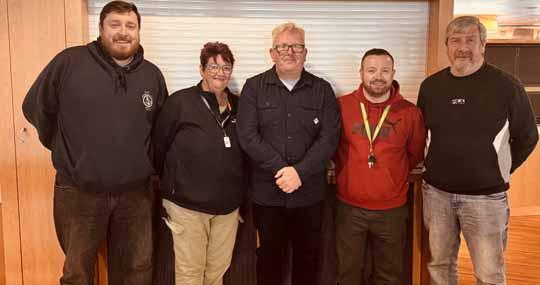

Michael Hobson held meetings in Birkenhead with seafarer members onboard Stena Edda discussing key issues and the latest pay offer. There were also discussions with RMT port operative members employed by Stena Line in Belfast discussing key issues, safety culture and providing an update on pay proposals.
Darren Procter also met with shipboard representative Emma Purcell onboard the Stena Embla operating between Birkenhead and Belfast.
RMThas called on the government to stop P&O Ferries profiteering from public funds following the release of the company’s 2023 accounts today nearly a year later than required by law.
The P&O accounts were published nearly ten months later than required by law following the resignation of its auditors in May.
The company has already broken the law by firing and replacing seafarer RMT
the deck department and newly elected shipboard representative James Clark to discuss key issues of RMT members.
Darren and Mick were also on the vessel Stena Brittanica which operates between Harwich and Hoek van Holland (see above). RMT held a local meeting with management discuss to industrial issues.
“Being visible to members within the workplace is essential to our port worker members and elected officials,” said Darren.

RMT national secretary Darren Procter visited members employed at City Cruises in York following a meeting with management in relation to pay.
”It was good to engage with members on industrial, safety and political issues and to identify how to be better organised in York and within the Inland waterways sector,” he said.
members with foreign agency crew who are paid under £5 an hour with no protection, working a minimum of 12 hours per days, seven days per week for months working in UK waters.
RMT general secretary Eddie Dempsey said that with P&O Ferries was a pariah company that torched its reputation and that of the UK shipping industry, to cut labour costs.
“The astronomical 172 per
cent pay award for executive pirate Peter Hebblethwaite is a slap in the face to seafarers and communities in Dover, Hull and Larne, direct from Dubai.
“P&O Ferries must be explicitly prevented from benefitting from public investment in green port infrastructure in Dover, Tilbury, Larne or Hull.
“The measures in the Employment Rights Bill must also be strong enough to
break the P&O business model, as the French government has done and return quality, secure jobs to UK workers in the ferries and ports sectors.
“We will continue to raise our concerns with government ministers to hold P&O ferries to account and ensure preventative measures are robust to prevent any other rogue employer in the shipping industry doing the same,” he said.


Oban is a major port for Caledonian MacBrayne ferries and incoming RMT branch secretary Michael McCloud opened his first meeting in the post by welcoming general secretary Eddie Dempsey.
Eddie welcomed the fact that ferry services will remain public hands and CalMac will continue to run the Clyde and Hebridean Ferry Service (CHFS) after the Scottish government extended the contract for another ten years.
He said that it was a major victory for the union.
“It is clear Scotland’s lifeline ferry networks must be publicly owned to protect jobs, services and public subsidy from private profit.
“These services are not just transport links, they are lifelines, essential for maintaining the flow of goods, supporting tourism, local businesses and providing access to vital public services,” he said.
RMT regional organiser
Gordon Martin said that as a publicly owned operator, Cal Mac had demonstrated a long-standing commitment to reinvesting in services and supporting local employment.
“This is reflected in CalMac’s apprenticeship programme which recently took in 20 new apprentices, an important investment in the future of Scotland’s maritime workforce.
“A direct award to CalMac is the best way to ensure that these jobs and others are protected and that the necessary improvements to services, vessels and harbours are made without compromising service quality or workers’ terms and conditions,” he said.
He pointed out that the union was calling for a summit involving passenger groups, trade unions, local businesses, and government to ensure that the future of Scotland’s ferry services was secured.
There was an in-depth

discussion about the best way to organise CalMac workers and Gordon Martin re-iterated the need to keep workers on vessels and shoreside staff in the same bargaining unit to ensure that no one was left behind.
He said that work needed to be done to recruit shoreside workers to the union and address any issues they may have. The meeting
identified a new shoreside RMT rep and a plan to organise these workers.
RMT NEC member Davey Douglas, who works on Northlink ferries services operating out of Aberdeen, congratulated Michael McCloud on taking up the branch secretary post and offered his services to support him on behalf of the union.


Transport workers ready to take action over staff assaults

RMTresearch has revealed that more than threequarters of frontline public transport workers were ready to take industrial action if employers continued to fail to protect them from escalating violence and abuse.
The findings are part of a new union campaign ‘Action Against Assaults’, which aims to drive industrial and political action across all sectors to end violence on public transport to protect worker and passenger safety.
The union’s latest survey of over 6,000 members across rail, bus, metro, maritime and underground sectors found that 63 per cent experienced workplace violence in the past year, and over 85 per cent of them were assaulted multiple times.
Most cases involved verbal abuse, with many also facing threats, physical assaults, and harassment including racist and sexist abuse.
Notably, 61per cent of the most serious incidents occurred during lone working.
The union has also cited British Transport Police figures showing a 47 per cent rise in violence and serious public order offences against rail staff between 2021 and 2024, alongside a five per cent yearon-year increase in work-
while simply doing their jobs.
“This crisis has been fuelled by rail employers seeking to de-staff the railway and failing to hold perpetrators to account.
“De-staffing of public transport also puts passengers at increased risk of assault and anti-social behaviour.
“Employers and the government must act now to end lone working, restore staff numbers, reverse BTP cuts and support the introduction of a specific offence for assaulting a public transport worker.
“If our members do not see progress on this critical issue, then they are ready to escalate matters industrially, up to and including taking strike action,” he said.
transport workers
- Ensuring adequate staffing levels and reversal of cuts to British Transport Police
- Better reporting systems, support services, and full sick pay for victims
- With 95 per cent of staff backing legal reform, 87 per cent calling for more staff on stations and trains, and nearly 80 per cent prepared to take industrial action, RMT is calling for urgent action to deal with staff assaults.
related violence and aggression on the TfL network.
RMT general secretary Eddie Dempsey said that members were being spat at, stabbed, threatened and abused on a regular basis
- Ending lone working and late-night vulnerabilities
- Stronger legal protections, with a standalone offence for assaulting public
RMT is backing a Parliamentary amendment to the Crime and Policing Bill, tabled by Rachael Maskell MP, to legally protect all public transport workers from abuse and assault—similar to existing protections for emergency workers and proposed ones for retail staff. The union will also pursue the amendment in the House of Lords.
The survey of over 6000 public transport workers found that:
• Nearly two-thirds (63 per cent) had experienced workplace violence in the past year.
• Of those, over 85 per cent had experienced violence multiple times.
• The most common form of violence was verbal abuse (92 per cent), followed by threats of violence or assault (63 per cent).
• Nearly a quarter had been physically assaulted.
• Members also reported experiencing a wide range of abusive behaviour including being assaulted with weapons; racial harassment; sexual harassment or assault; LGBT+ harassment and being spat at or targeted with bodily fluids.
• Of those who experienced workplace violence, 60 per cent were lone working at the time.
• Nearly 60 per cent had witnessed violent and/or abusive behaviour targeted at passengers.
• 75 per cent of those who experienced workplace violence reported the incident to their employer, but only a third of those were satisfied with their employer’s response to the incident.
• Of those who did not report it, nearly 70 per cent said it was because such incidents are considered ‘part of the job’.
• 70 per cent of RMT members thought that workplace violence had increased in the past year, and just three per cent thought it had decreased.
• When asked why they thought violence on public transport was so prevalent, members cited reasons including a lack of BTP/police presence; a lack of action taken against perpetrators; an increase in anti-social behaviour in society more generally and lone working.
• 95 per cent of public transport workers support the creation of a standalone offence of abusing or assaulting public transport workers at work.
• 87 per cent of members working in rail, metro and London Underground said that an increase of staff at stations and on trains would help reduce violence.
• Nearly 80 per cent of RMT members said they would be prepared to take industrial action over workplace violence, if they felt their employer was not doing enough to protect their safety.

A packed cleaners organising conference meeting in Cardiff backed the campaign for cleaning grades to be brought in-house as part of Great British Railways (GBR).
Tim Butler, York and District said that the union needed to hold the government to account and enact its pledge to end outsourcing.
“We need the same campaign the union carried out within Network Rail to end outsourcing,” he said.
Rebecca Stokes, Crewe No1 said that cleaners should not be treated as second class citizens on the rail network.
“We work hard for the money we earn, and the union needs to fight harder and smarter,” she said.
Bella Fashola, East Sussex Coastway called for the union
to carry out an awareness campaign focused on the mental health of outsourced workers.
“Outsourced cleaning workers remain among the most undervalued on the rail network.
“We are overworked, underpaid and treated unequally compared to directly employed staff.
“To make ends meet, many outsourced cleaners are forced to work well beyond a standard week. The result is not just physical exhaustion, but a growing mental health crisis among cleaning staff,” she said.
In order to get passengers and the public on side, she also called on the union to develop materials that expose the poor service provided by
private companies.
RMT general secretary Eddie Dempsey said that outsourcing was a scourge of the rail network which leads to low pay, poor conditions and systemic racism.
He said that it had been a hard battle to even win trade union recognition for outsourced cleaning grades but now we need to go further.
“We need to make insourcing as a number one issue for this union.
“We have had victories sometimes through industrial action but as we move into GBR we need to see justice for cleaners,” he said.
He said that outsourcing was really a hidden layer of privatisation which exploits thousands of workers
every day.
“Despite the fact that much of Britain’s rail services will soon be run by the government, a significant portion of the workforce remains employed by outsourcing and subcontracting firms.
“Workers endure low pay, precarious contracts, and poor working conditions while companies extract huge profits.
“For example, Mitie Plc paid £41.5 million in dividends and awarded its CEO a £14 million remuneration package.
“RMT estimates that around £400 million annually is diverted by outsourcing companies from public transport into private profits.
“These profits often go to investment banks and private
equity funds, not reinvestment in rail services,” he said.
Rebecca Stokes said that a key issue in the campaign must point out that outsourcing was not an efficient way to provide a service.
“The outsourcing model is more expensive because it allows low pay is become endemic while the profits are extracted out of the industry,” she said.
Mariana Zlatanova, Finsbury Park called for outsourced cleaning grades to receive the same staff travel facilities as directly employed staff.
“We deserve the same travel concessions as other railway staff,” he said.
Damian Carty, Gatwick Diamond said that many cleaning grade did not speak English as their first language
and often grievance procedures are difficult to understand.
“As a result, grievance procedures should be translated into the relevant languages to help workers understand them,” he said.
Bella Fashola also said that vulnerable workers with language issues can be open to bullying.
“Workers can be put under pressure to perform tasks without proper training,” she said.
Bella also called for changing facilities and clean uniform provision for cleaners as well as full company sick pay for all cleaners.
She called for the union to negotiate with the Office of Rail and Road, (ORR) and Health and Safety Executive (HSE) to demand a full

investigation into the conditions of all outsourced cleaning staff.
John Hill, Teeside said that the lack of provision of facilities for cleaners by outsourcing companies was purely down to profits.
Delegates voted to hold next year’s conference in London and Rebecca Stokes was elected as conference president taking over from Bella Fashola who has stood down after serving three years in the position.






Show your support for the union.
Go to the RMT webshop on the RMT web site for more details.
Promote your branch, region and the union - call Pellacraft on 01623 636 602 if you have any queries.



retention, the union’s president George Welch told delegates at the branch and regional council secretaries conference in Inverness.
He said that new developments around RMT’s digital transformation project would assist branch secretaries to organise members more effectively.
“We’ve got a new strategy for retaining and recruiting members coming up.
“The new membership system and the dedicated organising and recruitment team, combined with your experience as branch secretaries, are going to make a real difference,” he said.
He went on to thank local officials for all the work they did for the union including “pastoral care” as well as all the administrative work to keep branches going.
Casting an eye on upcoming changes in the industry, including public ownership of train and track, he said that the union needed to be prepared for changes in the industry.
“If rail is going back into national ownership that will bring change.
“I’m sure some of you were around when the industry was privatised, and you went
changes,” he said.
Scotland organiser Ann Joss who is responsible for offshore workers in the oil, gas and renewables industry, told delegates that the union was doing important work in that area and how the ‘just transition’ was not prioritising workers.
“Everything we use—our cars, the trains we travel on, the planes we fly in, the goods we buy in the shops— somewhere along the line, they all depend on oil and gas.
“But over the past year, we have seen a steady decline in what’s available from the North Sea.
“The so-called ‘just transition’ that everyone talks about, has turned into an unjust transition.
“The cost of moving workers from oil and gas into renewables hasn’t been properly met,” she said.
She praised the Scottish government £900,000 support package to help people gain new qualifications, but this only covers around 200 people.
“What about the rest?
“Those who don’t qualify for that support will have to pay for their own certification and even after that, getting a
Roddick, MSP for Highlands & Islands, praised the union for all its work and the oftenunfair criticism received from politicians and the media.
“It’s the collective strength of unions like RMT that ensures fair wages, safe working conditions, and a voice for every worker. These principles are non-negotiable if we want our public services to thrive.
“Your work is fundamental to the fabric of our communities. For us, rail isn’t just about getting from A to B—it’s about connecting dispersed communities, supporting our industries, and offering a sustainable transport alternative for
Delegates also called for clear rules to prevent branches being assigned to host conferences without their agreement, urging that all hosts be confirmed at least two years in advance to allow time for proper planning.
Concerns were also raised over training for branch officials, with calls for consistent, regionally delivered sessions covering essential roles like secretaries and membership officers.
Conference also recognised the difficulties in setting up bank accounts, proposing that head office take responsibility for the initial set-up and provide clear guidance and support.






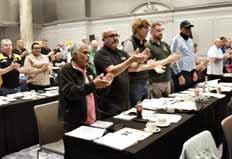



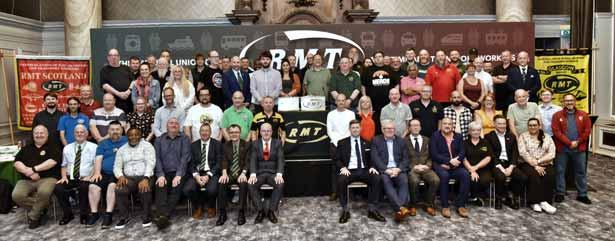
RMTannual general meeting
delegate Ross Marshall, Central Line West - a London Underground worker of over 20 years - recalled with horror finding out about the killing of Jorge Ortega at Ilford Station last year.
“I remember when I got the phone call about brother Jorge Ortega. A shocking incident. But the worrying and scary thing was, I wasn’t surprised,” he said.
He has been raising the appalling upsurge in violence as a workplace issue repeatedly, but employers did not seem inclined to take action.
“It had been spoken about, it had been raised by us, by other unions, and around the country about the level of shocking violence against transport workers.
“My own grades, in the same year, three members of my team—three members of this union—suffered horrific assaults, among many. One was knocked completely unconscious and still suffers flashbacks and brain problems
to this day.
“How have we come to this? he said.
It is a good question and part of the answer would appear to lie in attempts to de-staff the rail network and London Underground over the years.
“In 2014, the first major job restructuring programme cut nearly 800 station staff roles from the network. Then in 2016, under the so-called “Fit for the Future” plan, management claimed they would modernise staffing—but instead, they left many stations operating with staffing levels reminiscent of Victorian times. And even now, we are still facing ongoing waves of job cuts.
“The consequence is that there are parts of the Underground—especially after a certain time—that are becoming no-go areas. So, what do we do about it?
Where are the BTP as a deterrent?” he asked.
Mr Marshall’s frustration was understandable given that the British Transport Police has
faced swingeing cuts. In 2025 alone, the BTP is facing significant funding cuts due to an £8.5 million shortfall.
These cuts are expected to result in the closure of up to 17 BTP stations and the loss of nearly 300 jobs.
He received rapturous applause when he pointed out in a recent survey of over 6,000 transport workers, over 75 percent are prepared to take industrial action, if company bosses do not do more to protect their workforce.
“Members are prepared to take action and enough is enough,” he declared.
Steven Finn, Leeds city agreed that on the rail network the situation regarding the BTP was equally bleak.
“We’ve seen large areas of the country where there are no BTP available.
“Recently we had two members sacked for taking matters into their own hands rightly or wrongly, but it was because of a lack of BTP response,” he said.
In one of the most moving accounts at conference, delegate Joe Simpson described being assaulted during a shift and how RMT had helped him get through the investigation achieving a successful outcome where the company was held to account.
Referring to the union’s campaign Action on Assaults, he said: “It raised my spirits this morning when I came in and saw this campaign I am passionate about it and we all should be.
“The report states that 63 per cent of respondents experienced violence in the past year, with 85 per cent facing violence multiple times.
“The most common form was verbal abuse, reported by 92 per cent, followed by threats of violence and physical assaults, which affected 63 per cent of those surveyed.”
“Without the union I don’t know what would have happened,” he said.
Jessica Robinson, Darlington highlighted the need to fund the BTP properly
particularly during rowdy football matches.
“If the government can spend plenty of money sending weapons to commit genocide, can they please spare a few quid to stop me getting lamped on a random Saturday afternoon?” she asked to applause.
RMT president George Welch opened AGM with a direct call to “end outsourcing— permanently and decisively,” warning that it “fragments workforces, drives down pay and conditions, and allows employers to shrug off responsibility.”
He praised the effort of members to put public ownership “back on the agenda—not because it was gifted to us, but because we made it impossible to ignore”.
Speaking on behalf of the young members conference, Keirin Offlands, East London Rail said that bringing in more train operating companies under Great British Railways (GBR) was an opportunity to remove the scourge of subcontracting.
“Jobs such as gate line, catering, cleaning and safetycritical dispatch grades should be undertaken by in house staff not sub-contracted out to workers on worse pay, terms and conditions, and less strong or non-existent collective bargaining

agreements.
“Young people are deeply affected by precarious jobs and unemployment. Young workers are already overrepresented in precarious work. In Britain, young workers are twice as likely as older workers to be in severely insecure work.
“With the looming skills shortage as nearly 50,000 rail industry employees are expected to retire by 2030, it’s vital that rail jobs entice people of all ages to work in rail as a secure, fulfilling and well unionised industry.
“We need to end the race to the bottom in terms of jobs and pay.
“The transport industry should be offering young people a career for life with good pay, terms and conditions, opportunity for progression and union recognition,” he said.
RMT will seek to build alliances and strength with other trade unions to remove all the draconian legislation holding workers back, general secretary Eddie Dempsey told delegates.
Delegates passed two motions on campaigning for the adoption of sectoral collective bargaining where the union operates and pushing the government to remove bans on sympathy strikes.
Mr Dempsey spoke at length about current laws, praised the idea of statutory eballoting and railed against the injustice of workers not being legally allowed to take strike action in support of others in a separate trade dispute.
“I’m going to be really blunt here, I do not want any trade union legislation,” he said.
“I couldn’t care less about thresholds because we beat those with better campaigning. We don’t want them, but they are not the biggest problem.

“What I want is the ability to take my members out on strike as fast as possible.”
He pointed out the notice periods required under anti trade union legislation were all “nonsense” and should be scrapped as they were biggest obstacle to workers taking action.
“It prevents us from being able to respond like lightening when our members are under attack,” he said.
Referring to the P&O scandal and the fact the union was restricted in what kind of support they could legally take, he added: “if any employer in a sector behaves like P&O, we want to be able to bring our members out in the entire sector”.
Intolerable stress levels on Network Rail could lead to industrial action if unsafe staffing issues were not addressed.
Delegates slammed the Modernising Maintenance programme which Network Rail forced through without a union agreement, cutting planned maintenance by 50
per cent, reducing frontline staff, and imposing wholesale changes to working practices.
Charles Fisher, South East London Operations and Engineering said that these problems were a direct consequence of Modernising Maintenance.
“We have lost many competent staff, and the reality is people have got so much additional pressure from this failed and discredited system.
“People in Signalling and Telecommunications would rather leave and get another job than deal with the additional pressures Network Rail have unnecessarily created.
“As a rep, you try and point this out to the employer, but we have been ignored. And we’re not going to tolerate this situation any longer,” he said.
John D’Rozario, Birmingham Engineering who works on overhead line faults said that Network Rail did not have enough staff to cover all the issues which was increasing workloads and work-related stress.

Paul Reilly, Nuneaton pointed out that he had 34 years’ experience in signalling maintenance.
“The job is becoming increasingly stressful, with growing pressure to get all the jobs done.
“In many cases, that pressure pushes people to cut corners just to keep up with production demands and respond to faults faster, with less competent staff.
“When we first started on the railway, we had four grades, we had a technician officer, senior technician, a technician and an assistant technician.
“This has been slowly whittled down over the years to a team leader, a technician and an operative,” he said.
With a crisis in recruiting qualified staff and an over reliance on operatives, he said that fast track schemes were rushing people through with all the competencies on paper but not the necessary on the job experience and that this was negatively impacting on his work.
“As a team leader, there is a lot of pressure. I do a lot of testing and tens of thousands of passengers rely on me doing my job correctly,” he
catastrophic fires and make public transport a safe way to travel without fear.
Rail workers are calling for fair treatment after it was revealed that not all staff receive the same support following fatal incidents on the job.
Delegates agreed that while train drivers got immediate help—like being replaced and supported by a manager—other staff, such as train crew and shunters, are often left to cope alone, sometimes only receiving a quick phone call.
“This is not about undermining the driver grades as it is essential they get support. But what we are seeing now, is a two-tier system which looks after drivers but not onboard crew. It is care for one grade and lip service for another”.
Mandy Evans, Swansea 1 branch poured scorn on railway companies lack of care for staff adding: “It is about how incidents like this affect us emotionally. Where is the railway family? Chain of care? They don’t even know what that is,” she said.
said, adding that any mistakes could lead to a crash or derailment.
Delegates called for an investigation into the underlying causes of bus fires to understand how they can be stopped.
Ed Sturgess, Newport IOW No 2 told delegates that a bus fire had occurred on the Isle of Wight only the week before AGM.
“Yet we have received no evacuation training despite that fact that there is only one exit on the bus,” he said.
Lee Odams, Notts & Derby bus said that bus and coach fires had continued to be an all too familiar feature in the UK.
“Now is the time to take a fresh look at the root causes of catastrophic bus and coach fires as well measure on how best to prevent future ones, with such measures as fire suppression systems, the provision of improved fireretardant materials for new builds,” he said.
Delegates backed a call for new industry standards and legislation for design, construction, and furnishings to significantly reduce
This two-tier approach was slammed on conference floor by delegates who shared moving and sometimes difficult stories about their experiences.
Reflecting on consoling a member who had witnessed a fatality, Billy Kimm, Liverpool No.5 delegate said: “When I’ve had to go to houses, to meet members who have been affected it can clearly destroy people’s confidence”.
He blasted train companies which failed to properly look after staff adding that they only see you as a “tool, a number and they don’t care about you”.
Martin McCleary, Berwick Rail said that there was often no face-to-face support from the companies.
Delegates narrowly backed a call for the government to cease supplying weapons and military, logistical and intelligence assets to assist Israel’s genocide in Gaza and attacks on Lebanon, Syria, Yemen and Iran.
Sarabjit Gill, Paddington No1 called for an end to supplying British-made weapons, military support, credit and billions of pounds in public funding to Ukraine rather than working for a negotiated lasting peace and disarmament.
“We reject the politics of lowering living standards and cuts in public services to fund a policy of unending and escalating war that is relentlessly taking us to the brink of nuclear Armageddon.


“The trade union and labour movement and the Labour Party should work actively for peace by promoting policies that end its promotion of global war,” he said.
Dan Randall, Bakerloo opposed the motion and called for the continuation of funding for Ukraine to fight the ongoing conflict following the Russian invasion in 2022.
Backing the motion David Duboff, Southampton Shipping said that the war in Ukraine did not start in 2022 but in 2014 when NATO powers armed and funded neo-Nazi forces which overthrew the elected government in Ukraine.
RMT general secretary
Eddie Dempsey said that the union did not support the Russian invasion but called for a negotiated settlement rather than endless funding for weapons to continue the conflict.
Delegates supported a call for the Labour government to sever economic ties with Israel until it abided by UN resolutions and ended its programme of financial and military support for war in Ukraine and committed to work for a diplomatic, negotiated, lasting peace settlement.
Left MP John McDonnell praised workers across Europe for their stance on the war in Gaza where some have refused to load ships with

weapons bound for Israel.
One such instance was when France’s CGT dockworkers refused to load arms at the country’s largest port in Fos-Marseille.
Speaking at AGM, the convenor of the RMT parliamentary group reflected on his recent arrest at a proGaza demo alongside former Labour leader Jeremy Corbyn.
Expressing pride at his involvement in Palestine solidarity campaigning and condemning Israel’s bombing, he said: “It is a war crime and the amount of children being killed is unacceptable”.
Pledging full support for the union in its campaigns ahead, he added: “Whether it is in Parliament or on the

picket line I’ll be with you”.
Eddie Dempsey thanked the Harlington and Hayes MP saying: “John has worked tirelessly not just on the Employment Rights bill but on our work around insourcing.
“You’re a great friend to our union, a socialist and we are proud to have you in our ranks.”
Delegates expressed disappointment that many employers do not provide bespoke safe and secure areas for women members to breastfeed.
RMT has written to train operating companies demanding action but have received a satisfactory a response.
Delegates are now demanding that as part of all RMT collective bargaining agreements, recommended facilities include: a break allowance for mothers to express milk, provision of a clean, warm, private room that is not a the toilet for expressing expressed milk, a secure, clean fridge to store expressed milk and flexible working hours for breastfeeding mothers.
Speaking on the unanimously endorsed motion, Darlington 1 branch delegate

Jessica Robinson said: “In 2025 we still have breastfeeding mothers forced into dirty toilets during their lunchbreak to express milk with a cooler bag to put in if we’re lucky.
“Employers do have a legal obligation to protect the health and safety of breastfeeding mothers and to provide a space for them to rest at some point during the working day, but everything else is currently just a guideline.”
She added: “We’re living
through an intense cost of living crisis which sends women back to work from maternity leave far sooner than they ordinarily would, because they cannot afford to live on the pittance that is statutory maternity pay.”
Emma Abel, Sheffield and District told conference:
“There is no legislation in place, so the employer has the choice as to whether they provide these facilities or not.”
She mocked employers for failing breastfeeding mothers accusing companies in some

cases of “sticking a sign on a broom cupboard door” which she declared a “token gesture”.
RMT must resist the evil of racism and “protect the vulnerable amongst us” said delegate Uchenna Ngadi, Croydon No.1.
He moved the unanimously backed motion calling for union branches to cooperate with local trades councils and community groups to combat the far right.

“Fascism does not always come wearing jackboots.
“Sometimes it wears suits, speaks in soundbites, or wraps itself in a flag and calls that patriotism.
“But they always feed on division and racism.
“Racism and fascism are on the rise, fuelled by right wing media and political rhetoric, exploiting economic hardships. Our conference condemns the targeting of minorities and applauds the activists who have confronted these movements,” he said.
Scottish TUC general secretary Roz Foyer laid down the gauntlet to the political class in Holyrood and Westminster urging them to tax the rich and deliver for working people.
In a wide-ranging speech, Ms Foyer praised the union for showing leadership in the industrial arena particularly during the national rail dispute.
“On behalf of Scotland’s workers, I want to thank you all. For your leadership during the cost-of-living crisis. For reminding the working class of our power,” she said.
She acknowledged that unions did now have a voice in
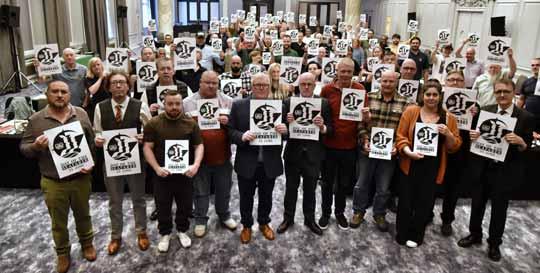
both Holyrood and Westminster.
“But let me be clear: a seat at the table is not enough. Listening to unions must mean acting on what we say—even when it’s uncomfortable for the decision makers to hear,” she added.
“Let’s be honest: our mainstream political class are drinking in the last-chance saloon. For all their talk of change, they haven’t stood up to billionaires, or really delivered for working people, & the voters have had enough, and are looking for solutions elsewhere.”
“Let the tough decisions fall on the rich, not on workers, poorly paid pensioners or the disabled,” she said.
RMT demanded urgent action from the government to ensure unions can take preemptive legal action against law-breaking employers before they carry out mass sackings like those seen at P&O Ferries.
The union is calling for powers to allow unions to stop rogue employers in the courts before they axe unionised crews and replace them with agency labour on poverty pay and exploitative rotas.
Speaking on the Day of the Seafarer - an International Maritime Organisation event, celebrating the invaluable contribution of seafarers to global trade and the world economy, national secretary Darren Procter said: “If we are serious about saying ‘No More P&Os’, then we need laws that let unions get into court and stop the damage before it happens, not after workers’ jobs and lives have already been torn apart.
“The government’s progress on the Seafarers Charter and the Employment Rights Bill is welcome, but now it’s time to finish the job,” he said.
Speaking on behalf of retired members Arthur Richardson condemned government attack on older people by means testing the winter fuel payment.
“This decision has hit pensioners very hard with many of them living just above the pension credit threshold.
“It is estimated that 2.5m older people are struggling to heat their homes and they will have to choose between heating and eating,” he said.
Delegates backed a campaign for the reinstatement of the winter fuel payment with the union’s parliamentary group and to
support the National Pensioners Convention campaign.
They also backed a campaign to abolish the freeze on the personal tax allowance which has been frozen at £12,570 since 2021 and the present chancellor has proposed the freeze remains at this level until 2028.
“This freeze has brought thousands of pensioners back into the tax net, many of those on modest incomes causing them much hardship,” said Mr Richardson.
RMT has called for the end of right to buy, rent controls and
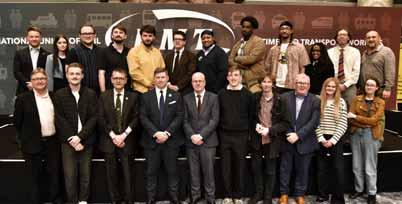
real action to tackle the housing emergency during a fiery AGM debate in Glasgow. Delegates poured scorn on the state of council and social
housing, with many sharing their experiences of poor housing and housing rents, particularly young trade union members.
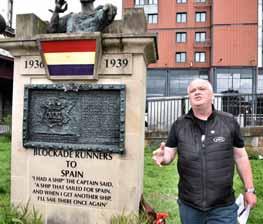
Seconding the motion, Michael Bainbridge, RMT Offshore said that the housing emergency was due to “a private landlord set up, rigged in favour of capitalists, slum landlords and spivs.
“They are the ones who profit from it, they have no concern for the working poor or their wellbeing,” he said.
Jim Buchanan, Dorset Rail said that homeownership had become a pipe dream for most young people.
“If you’re a youngster working in our industries you have almost no chance,” he said.
He backed the call for establishing rent costs as a major factor in national wage bargaining saying that such a position would greatly benefit members.

LU Fleet delegate Rhys Harmer was presented with the John Cogger award for 2025 which is awarded annually to one young member a year for their outstanding contribution to the union. Eddie Dempsey said that Rhys had an enthusiasm for organising workers that was infectious which had helped to build the young members annual conference into one of the biggest in the union.
“Rhys played an outstanding role during the national rail dispute as well as in the campaign to recruit outsourced workers on
London Underground. He was the driving force behind the union’s Apprentice Charter to win better pay and conditions for young members.
Rhys said that he was honoured to receive the award and called on branches and regions to encourage young members to step up to take positions in the union.
“I am often told that we are the future of the union, but we know that young people up and down the country are already playing crucial roles which we should all celebrate and support,” he said to a standing ovation.
He said that the proliferation of Air BnB’s had led to: “people moved out and evicted, so I can now have a load of stag do wallies underneath me every weekend in the summer.
“There is only one solution to this - an extensive programme of rented housing provided by the state for as the need exists or for life,” he added.
Rhys Harmer, LU Fleet said that he counted himself lucky to live and work in central London in social housing in a good, unionised job, while the friends I grew up with outside London are all live in houses of multiple occupation.
“I’ve got what I think everyone should have by right,” he said.
He savaged the political class, adding: “They do not care because they are all homeowners. If you look at Tories and Labour, there is a humongous issue of home ownership in the political class.”
Mr Harmer added that the crisis in housing had spread from London to major cities like Birmingham and Manchester, saying:” There is a serious issue over what housing is. Is it a necessity where people deserve to live or a commodity for the rich to make money on”.
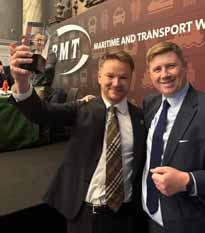
Delegates meeting in Cardiff at the union’s disabled members’ conference called for a campaign against the government’s proposed benefits’ cuts that will have a massive effect on disabled people.
Delegates were welcomed to the busy conference by Roger Fowler of the host branch Cardiff Rail. The longstanding member of the disabled members’ advisory committee told delegates that this was his last conference as he was retiring from the industry.
RMT assistant general secretary John Leach said that disability was a core issue for the union and that a current review of the organisation’s training programme will ensure it has its rightful place.
“Our work on disability is essential. Of course, more could always be done, but the union is fully committed to driving things forward,” he said.
He then explained that while the Labour government had made progress in partially bringing the rail network under state control there were still many workers in the industry that remain in the private sector.
“Changes to employment legislation and anti-union laws have not gone far enough and we are also heading for a moment of reckoning with the government over pay.
“After our three-year industrial fight, we could be back there again,” he said.
Guest speaker Ben Golightly of Disabled People Against Cuts Swansea explained that his organisation

was working with the local trades council and union branches as they face sweeping cuts in the wake of the government’s Spring Statement.
He said that there is much to be learned from unions as the way the government intends to implement some benefit cuts was like how bad employers attacked workers’ rights.
“If you signed on for benefits later then you will be worse off and receive worse treatment than those already receiving benefits. What we take from the unions is ‘an injury to one is an injury to all’,” he said.
Sophie Ward gave an update on two key campaigns, violence and assaults and ending outsourcing and an update on ticket offices and how, despite RMT’s successful campaign against the closure of ticket offices, some companies were reducing services and the impact that this has on disabled people and access to
rail travel.
Guest speaker Rhianydd Williams, equality and policy officer Wales TUC, ran a session based around “disability and ‘hidden’ impairments in the workplace toolkit”.
Adrian Morgan, Neasden called for the union to take immediate action over the lack of public information screens, audio announcements or visual updates on Chiltern Railways.
“We need to protect the rights of disabled passengers and ensure that on-board accessibility is upheld across all train operators,” he said.
Stef Ilic, Hull Rail outlined the problems that Network Rail’s new drug and alcohol policy would create for workers in the industry.
He told conference that the poor wording could mean that even if a worker is using a prescribed drug they could face charges of gross misconduct. He said that this could happen if they are screened for drugs and the
medication that they are using is not on an approved list. Conference backed the call for the union to take the drugs and alcohol policy up with Network Rail to ensure clarification and that members will not be adversely affected.
Colin Stewart, Plymouth No 1 made a rousing appeal to delegates to get the union behind a broad campaign against the government’s proposed welfare cuts.
Devika Edwards, Waterloo explained the detrimental effects these cuts will have on disabled people.
“Benefits such as Personal Independence Payments (PIP) and the Limited Capability for Work Amount can be a lifeline for households with disabled people in them and can enable people who receive PIP to work.
“Cutting disability benefits would have a catastrophic impact on disabled people, undermining their ability to participate fully in society,” she said.
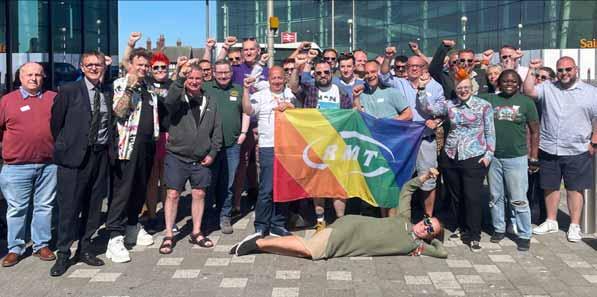
LGBT+ union activists pledged solidarity with all those facing discrimination, at their annual advisory conference in Blackpool.
The call followed a UK Supreme court judgement on the definition of ‘woman’ for the purposes of the Equality Act, which some in the trans community have felt negatively impacts on them and non-binary individuals.
Bakerloo Line branch delegate Georgie Duane said that the EHRC’s interim guidance was confusing, unworkable, and discriminatory - ultimately contradicting current practices that respect workers’ right to use facilities matching their gender.
The motion also pointed out that RMT’s position unequivocally supports all
trans and non-binary members within the union.
Recently the union expressed its long-standing support for the Equality Act 2010 which provides protections for women and trans people facing discrimination adding that RMT had a proud history of fighting all forms of oppression both in Britain and internationally.
Conference also passed a motion from Blackpool & Fylde branch in reaction to British Transport Police’s April 2025 policy of conducting searches of trans women by male officers.
The resolution condemned the lack of consultation and demanded urgent changes including proper healthcare provision and respectful treatment in custody of
suspects.
Perth No.1 branch successfully moved a resolution declaring trans and non-binary members had the right to define their own gender, and that the union was committed to ensuring this is respected in the movement and the workplace following the blocking of the Gender Recognition (Scotland) Bill 2022, by the UK government.
East London Rail Branch noted in their unanimously passed resolution, that hate crime was rising fast, with transport workers facing particular risk and that the government need to act to create meaningful punishments and sentencing for offenders.
Conference heard from several guest speakers
including RMT assistant general secretary John Leach.
Acknowledging that the trade unions had more progress to make on equality matters, he said that RMT on been on a journey of “discovery and enlightenment” when it came to issues of equality and diversity.
“This is what a trade union does - fighting for equality for ordinary people no matter who they are or how they define themselves and making sure they are treated with dignity.
“That’s why this conference, this part of our activity as a family, the RMT, is centre and core of everything we are about,” he said.
Speaking about the Supreme Court judgement, Mr Leach said the union would continue to “digest” its
contents and any guidance that is issued.
Mr Leach added that the union must adapt to the modern age regarding AI and other developments but also retain “our core identity, which is we are a working class organisation, here for our class in this society against the dark forces represented through management, banks and all of that”.
Local MP Chris Webb praised Blackpool as a place historically where workingclass homosexual people felt safe and not ill judged for being who they want to be.
“For some it meant escaping the surveillance of small towns.
“For many it was about walking down the street without fear, all for the taste of liberation. These radical acts paved the way for the future.
“Blackpool did not just open its arms to LGBTQ+ visitors. It gave them work and
allowed them to build their lives here,” he said.
Mr Webb expressed concern that hard won rights could be undermined, saying: “conferences like this are about our collective power and that’s something both trade unionists and queer people have always understood instantly.
“We know that rights don’t trickle down. They are fought for, and they are won together, whether that is on a picket line, a Pride march or in the everyday acts of resistance and rebellion”.
During in a Q+A, the Blackpool South MP expressed his solidarity with the trans community and said that there were genuine worries regarding the Supreme Court judgement and dire state of health services available for people considering changing their gender.



An RMT member who suffered multiple injuries after a fall in poorly maintained staff toilets has secured a settlement from his employer. The incident occurred when the member went to use the staff toilets during his shift.
Upon entering, he found the lighting broken, leaving the room in darkness. He also noticed the floor was wet, presenting a slip hazard. As he sat on one of the toilet seats, the seat fell off, causing him to fall heavily onto the floor. In an
attempt to break his fall, he extended his right foot to brace against the wall and used his right arm to catch himself, resulting in further strain. During the fall, the side of his chest struck the broken toilet seat, and he also jarred
his left hip upon impact with the floor.
Following his ordeal, the RMT member instructed workplace injury experts at Thompsons Solicitors to bring a claim for compensation against his employer for failing
If you are experiencing difficulties in the workplace and need advice regarding a potential employment tribunal claim contact the union.
In the first instance, ensure that you contact your local RMT Representatives or Regional Organiser. Then complete an L2 – Request for Legal Assistance (available on-line) and send it to your Regional Office with all supporting documentation.
RMT’s legal department deals with virtually all cases from assessment to the case’s conclusion at a tribunal for members across England and Wales. The legal department has also submitted claims to Employment Appeal Tribunals.
The in-house legal department is now firmly established and employs four solicitors and continues to advise and support
Your Free legal service covers:
members in their work-related criminal cases in the Magistrates Court.
This often involves defending members against false allegations made by the public of assault, false allegations of theft and alleged driving offences. Furthermore, it continues to offer tailored advice and support for bus and taxi drivers, in respect of their licensing issues, licensing appeals before the Magistrates Court, driving offences, and in respect of appearances before Traffic Commissioners.
The In-house legal department continues to strive to deliver a first-class service to all of members. They are committed to provide a strong service to assist the union through the ever-changing legal landscape and their successes have grown yearly.
• Employment Law – provided by the RMT Legal Department
• Access to Personal Injury Lawyers – where 100 per cent of compensation is kept by members.
• Access to a basic will service.
• Access to special terms for conveyancing, probate, powers of attorney.
• Access to special terms for family law related matters.
The contact number for the legal department is 020 7084 7260 or go on-line to rmt.org.uk/about/legal-services/
to provide a safe working environment. His injuries included damage to the chest wall, right shoulder, left hip, right foot, and neck.
The employer went on to accept responsibility for the incident, and our member later received an out-of-court settlement which reflected the severity of his injuries and the impact that they had on him personally and professionally.
This case and the legal outcome demonstrates the
importance of employers to maintain safe and well-lit staff facilities to protect workers from preventable accidents.
An RMT member who suffered whiplash injuries to her neck, shoulder and back has received compensation following a road traffic accident. The member was injured when another driver’s negligence caused a collision, leaving her with painful soft tissue injuries and disrupting both her personal life and
I am honoured to open our annual general meeting in Glasgow which is the engine room of this union because the decisions we make matters to every single member and their families.
The truth is our industries are changing. Technology, ownership models, legislation, climate demands, and workforce expectations are not distant issues. We can either wait to be shaped by change, or we can organise together and shape it ourselves.
Our strength lies not just in numbers, but in experience, in skills, and in our collective voice. We don’t resist change out of fear. We engage with it because we know the cost of being excluded.
We may need to evolve, to change, be brave, and consider partnerships that will strengthen us through common endeavour.
We’ve seen what happens when workers are left out. When coal and steel communities were dismantled without a plan. When public
Following her ordeal, the RMT member instructed personal injury experts at Thompsons Solicitors to bring a claim for compensation against the other driver’s insurers. The Defendant insurers were not prepared to meet a realistic value of the members claim and despite efforts to negotiate proceedings were issued in an effort to obtain a fair settlement.
The Court assessed the
claim, and the member was awarded a settlement of £2,700, which reflected the severity of her injuries and their impact on her day-today activities. Importantly, no deductions were made from this sum thanks to her union membership.
Cases such as this underscore the value of the union’s legal service in supporting members who are injured both in and outside of the workplace.
services were carved up and sold off. When contracts were awarded to the lowest bidder, and workers were expected to make do with less. But we can see what happens when we act together. Public ownership is back on the agenda because we made it impossible to ignore. Now we face the challenge of making sure it’s a real shift in priorities: decent work, investment in skills, and a need to end outsourcing.
Outsourcing has done untold damage as it fragments workforces, drives down pay and conditions, and allows employers to shrug off responsibility. Many politicians now in positions of power have told us they agree—have told the public they too want to end outsourcing.
But words are not enough because ending outsourcing isn’t just the right thing to do—it’s a necessary step toward rebuilding a fair economy.
We cannot allow ourselves to become complacent or

distracted because the forces of deregulation, casualisation, and fragmentation have not gone away. They have merely adapted. Our task is to stay alert and unify our collective strength across all sectors we represent. That is how we honour our founding principles. And that is how we build a union not only fit for the future, but capable of shaping it.
As we gather here, the world continues to face instability and violence. Nowhere is this felt more deeply than across parts of the Middle East, where innocent civilians are paying the highest price for conflicts they did not choose.
As a union grounded in solidarity, we reaffirm our
commitment to peace, to justice and to the protection of human life, wherever it is under threat.
I would like to thank conference delegates who are representing branches with pride and purpose and to our dedicated union staff at Unity House and up and down the country.
This union is what it is because of your work—seen and unseen. On behalf of all our members. So let us face the future with renewed energy and optimism in our collective ability. Thank you.
George Welch
This is a truncated version of the president’s AGM speech.
Being a part-owner in your own bank must be a good thing, right? Starting it up is probably beyond most of our membership but RMT has already set up a savings scheme for its members in the form of a Credit Union.
This facility, which is only available to RMT members and then families, was explained to me when I was on a Workplace Reps course at HQ in Doncaster last year as I had no idea it was a thing.
After listening to the information on the Credit Union, I signed up in minutes while still sitting in the classroom on the course. I
should of course have been listening to the tutor. After saving for a few months, I got to thinking why every member of the RMT union was not a CU member as it really was a 'no brainer'. One of the reasons I believe is the awareness of members, not just of its existence, but what it offers to us as members.
The story in the course I was on ran through the basics but the thing that got my attention was that the model was inherited from a large Australian union, the MUA, with more members than the RMT and covering more industries.
During a period of industrial action in Australia the workforce managed to break down the employer (the Australian government in this case) and won a dispute by taking long term strike action.
The ability of members to sustain long-term strike action was because all their mortgages were held by their Credit Union. Thus, the Credit Union was able to suspend some mortgage payments during the dispute. That of course meant that the membership could maintain a much longer period of strike action in support of their dispute, and this ultimately
tipped the balance in their favour and the dispute was won.
If every RMT member joined our Credit Union, it could put us on a path to achieving a similar facility in the future. Not only would this benefit current members but it would also promote RMT membership to get access to the facility.
We would also be creating a legacy for future members of our union of all grades by being able to use our own ‘bank’ for mortgages, loans, Summer and Christmas Savings Clubs to name but a few potential services.
You just save a minimum of £5 per month and then after a short time, you can borrow from us. As you pay down your loan amount each month, you only pay interest on the outstanding balance.
There are no hidden costs to saving and borrowing with the RMT Credit Union. If you pay up early you simply pay the balance and any interest due at the time. NO Handling or Administration charges and NO penalty charges. We have accounts to help you put money aside for your holidays, Christmas or even encourage your children to save. For more information, check the RMT Credit Union Website or fill out the application form on inside back page. Run by RMT members for RMT members and their families.


Once you are a member and a regular saver, other benefits open up to you, including loans at preferred rates with interest calculated on balance, rather than added at the start of the loan and then divided into monthly repayments.
The longer you save the bigger the uplift on what you can borrow. In the first year you can borrow up to three times the amount you have saved, and after a year you can borrow up to five times that amount. After a bit of research, I cannot find a cheaper way to borrow money
anywhere. There is literally no good reason that I can think of for not being a member.
Profits from the various lending options are paid out to members in the form of a dividend (on the first £10,000 of shares only) rather than in interest so those members that borrow money and pay interest may also get a dividend from the contributions they are paying back.
The only criteria for asking for a loan is that you are a member of the Credit Union for over 13 weeks.
It is run by a voluntary
Board of Directors who are elected by RMT members at the AGM and these people run our savings bank for us. It is OUR Credit Union looking after OUR members. You can even open a Junior Savers deposit account from birth right up to the age of 16 for any child living at a parent or guardian adult member’s address. Your spouse too can open an account as a nonmember, again as long as they living at the same address as the adult RMT member.
I would love to see every member, all 82,000 odd of us, using and financing our Credit

Union as it has all the benefits listed here. I’d personally love to have my mortgage managed by RMT rather than some massive corporate institution that just sees me as fodder in the money game that they play daily and that affects all our lives, never to the benefit of the working classes.
Our Credit Union is different and for me being a contributing member, even if it is just £10 a month is a no brainer.
To join go to www.rmtcreditunion.co.uk and if you have any questions contact c.union@rmtcreditunion.co.uk or call 02035355820
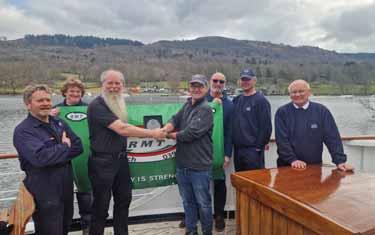
hilip Viney has retired from Windermere Lake Cruises after 32 years as an RMT member which included a number of years as a workplace representative.
When Philip first joined the union he was a member of Liverpool Shipping branch before Cumbria Lakes branch was created.
Philip started working for Windermere Lake Cruises as a seasonal crewman before being taken on full time working his way up to senior master of the M.V.Swan.
The picture shows Philip Viney (front right) receiving a retirement gift from Cumbria Lakes branch secretary Bernard Atkinson with other members and work colleagues looking on.


Members
years as ‘the best branch
Stuart Reid has stepped up to the secretary role after having served as
Bob
During Bob’s tenure
branch



Use the QR code to join to get help at work and save money

RMT has developed a number of benefits to save members money. This includes negotiating access to savings and special offers from our approved partners.
The union has a dedicated team of elected officers and local reps to serve your interests negotiating with employers on issues from pay, hours of work, pensions and working conditions. They are supported by a team of researchers to formulate pay claims to obtain the best negotiated terms for you.
The union has a political fund to run campaigns and provide a political voice to benefit members’ interests in the workplace. RMT has a very active parliamentary group which raises issues of concern for members at Westminster, the Scottish Parliament and Welsh Assembly.
Personal injury claims cover if you suffer an accident in work or outside work. RMT underwrites settlements that would not be provided by no-win, no-fee companies. Call 08457 125 495.
Members who have suffered an industrial disease will receive free legal support to make a claim. Such claims are underwritten by the union and members will not have any deduction from their settlement unlike claims run by no-win, no-fee companies. Call 08457 125 495
Should a member find themselves unfairly
dismissed, discriminated against or have any claim which has reasonable prospects of success at an Employment Tribunal, RMT will provide legal representation and pay the fee. Even if the union is advised that the claim is unlikely to succeed, members who make a claim are eligible to receive free legal advice.
Payable if you have an accident at work or on the way to or from work. Accident benefit is only payable if you have been off for three days or more. Accident must be reported to branch secretary within 26 weeks in order to qualify for accident benefit.
Payable to any member who retires over the age of 60 or aged 55 if retired through redundancy or resettlement. Ill health retirement is also payable; proof of this must be sent with application for retirement benefit.
The union can provide a personal taxation service and will preparation service.
Payable to any member who is experiencing loss of wages through being permanently demoted or downgraded as a result of illness or injury. Payment of £300 provided that member reports this to branch secretary within 12 weeks.
The beneficiaries of this fund would be any child of a member or spouse if the member dies in service or if a members’ spouse dies and the member has responsibility of the children. Benefit is paid while a child is in full-time education up until the age of 22. Payment is made quarterly and the rate is £12.00 per week for children up to the age of 16, then £12.75 per week from 16 to 22.
Accessible savings and affordable loans from RMT’s Credit union. www.rmt.org.uk/about/credit -union
Shop online with RMTrewards.com and earn cashback savings from hundreds of retailers, like B&Q, Argos and Tesco. It’s free to join, plus you’ll get a FREE £10 Welcome Bonus in your online account! (Terms and conditions apply) www.rmtrewards.com
if you drive a company vehicle as part of your job you can join the RMT fines pool for £7 per year. The Fines Pool will reimburse members for any speeding fines, related court costs and lost time to attend a court hearing. www.rmt.org.uk/memberbenefits/fines-pool
A Death Grant of £600 is payable to the nearest relative or legal representative if a member dies through any cause prior to retirement.
Fancy cashback on your everyday shopping? Use your RMT Prepaid Plus Cashback card at over 50 partner retailers, including Sainsbury’s, ASDA and Boots, and earn unlimited cashback! It’s different to a credit or debit card - you can only spend what you load so there’s less chance of getting carried away. www.rmtprepaid.com
As a benefit of your RMT membership you can register for £5,000 Free Accidental Death Cover. Cover is for UK residents aged 18-69.12 months free cover.
Annually renewable and always FREE. This policy is underwritten by Stonebridge International Insurance Ltd. www.rmtprotect.com
For a small monthly premium you can claim cash-back on dental, optical and therapy treatments. Visit www.bhsf.co.uk
Assistance for members with their potential employment tribunal claim offered through the RMT’s In-house Legal Department.

